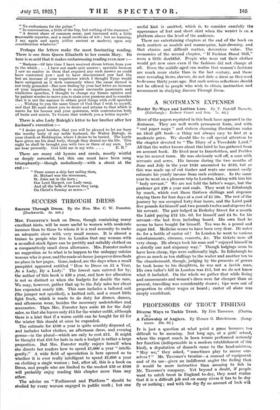A SCOTSMAN'S EXPENSES
MOST of the papers reprinted in this book have appeared in the Scotsman. They are well worth permanent form, and with " end paper maps " and sixteen charming illustrations make an ideal gift book—a thing not always easy to find at a moderate price. We should like to call special attention to the chapter devoted to " The Diary of a Tweedside Laird." All that the writer knows about this laird he has gathered from an account book. He lived near to Innerleithen, and Peebles was his nearest town. He was obviously well off, a man with servants and acres. His income during the two months of June and July in the year 1830 amounted to £810, but as this was made up of cut timber and rents one cannot easily estimate his yearly income from such evidence. In the same year he went on a pleasure trip to London, taking with him his " body servant." We are not told the latter's wages, but the gardener got £20 a year and coals. They went to Edinburgh by coach, which cost them thirteen shillings and sixpence staying there for four days at a cost of £5 10s. The rest of the journey by sea occupied forty-four hours, and the Laird paid five pounds for himself and two pounds twelve and sixpence for his servant. The pair lodged in Berkeley Street for a month the Laird paying £13 13s. 6d. for himself and £4 9s. for his servant—the last item including board. His own food he seems to have bought for himself. Tea was 6s. a pound and sugar 10d. Medicine seems to have been very dear. He notes Os. for a bottle of castor oil ! In London he went to various entertainments, circuses, concerts, &c. The tickets were all very cheap. He always took his man and " enjoyed himself in a strictly one and sixpenny way." Though lodgings seem to have been cheap, tips were sufficiently high. In Edinburgh he gives as much as ten shillings to the waiter and another ten to the chambermaid, though, judging by the presents of gowns he took home to his daughters, he was not a lavish man. His own tailor's bill in London was £15, but we do not know what it included. On the whole we gather that while living and amusements and women's dress were far cheaper than at present, travelling was considerably dearer ; tips were out of proportion to either wages or board ; castor oil alone was simply exorbitant.


























































 Previous page
Previous page